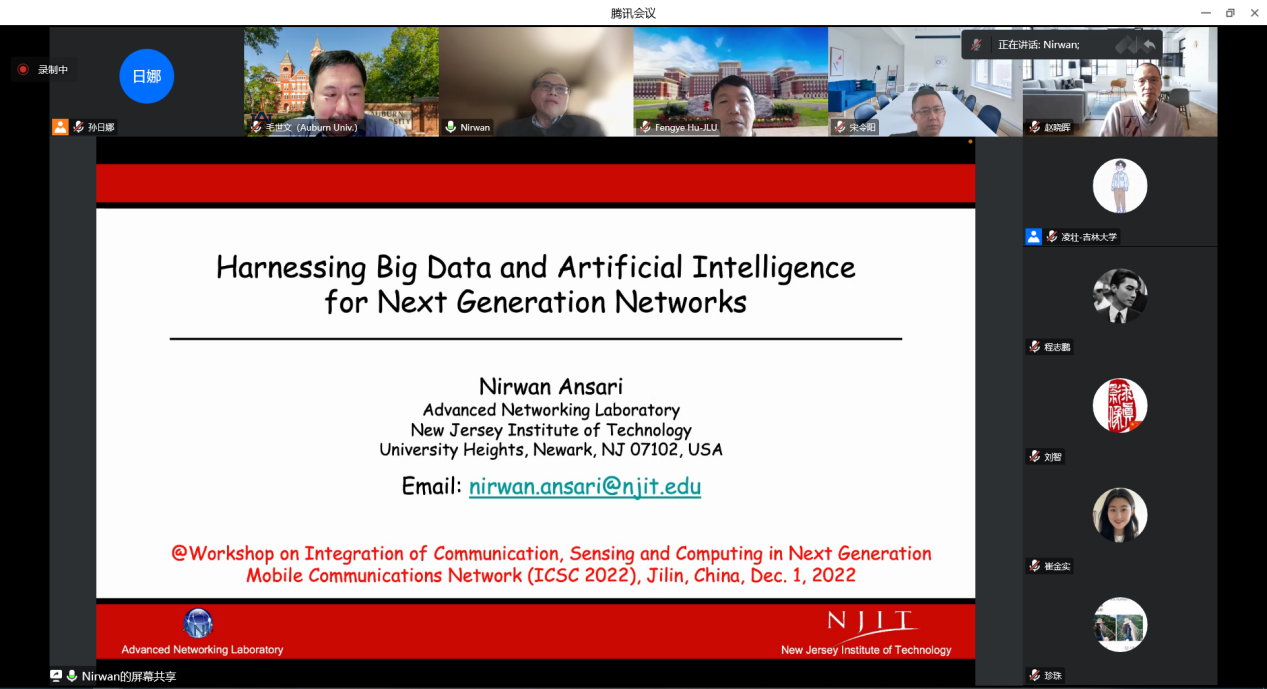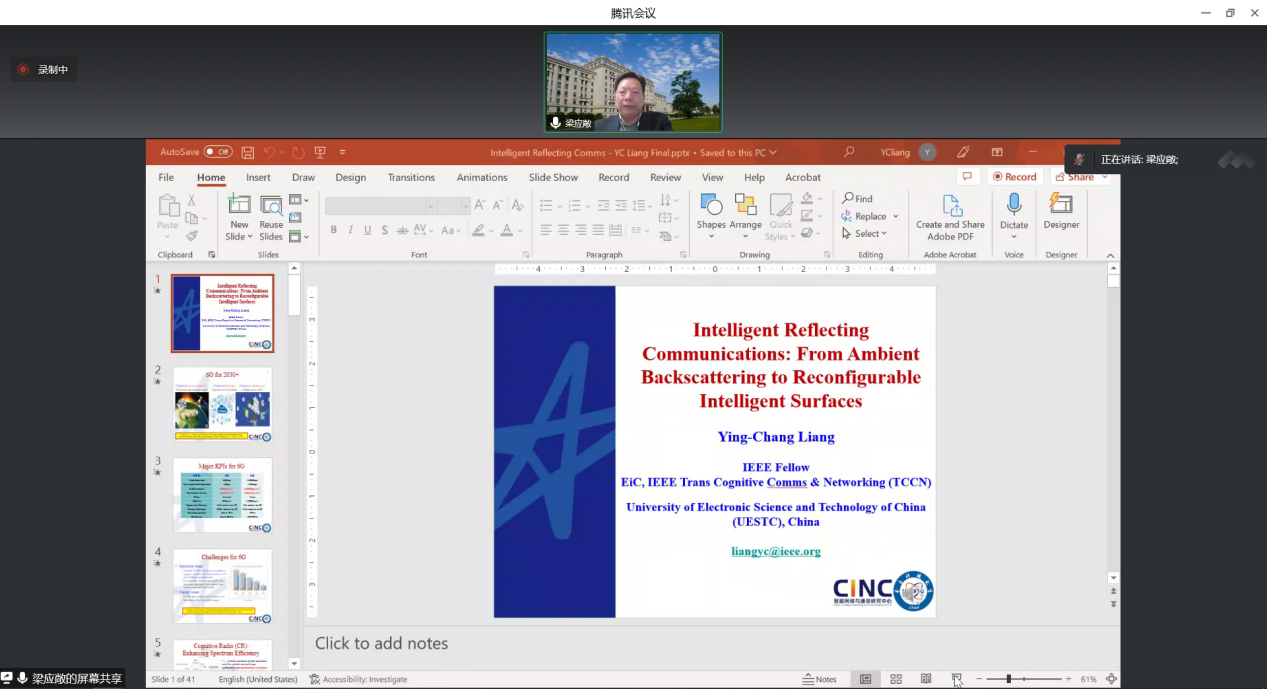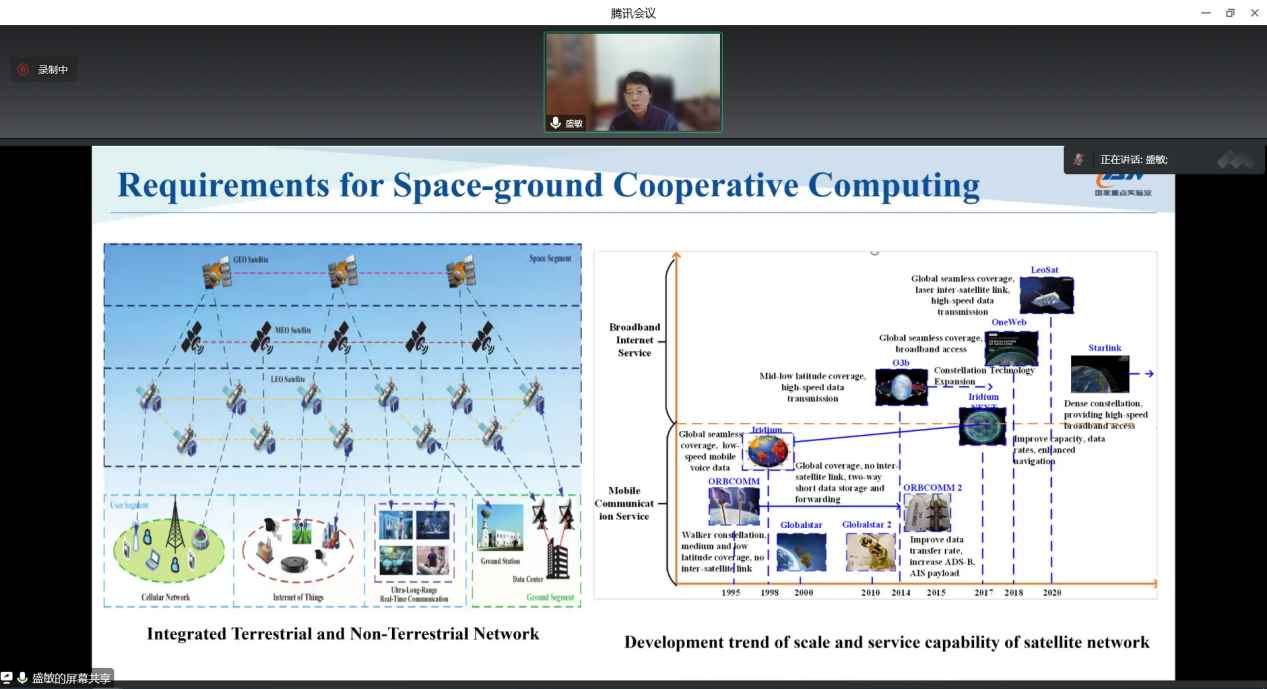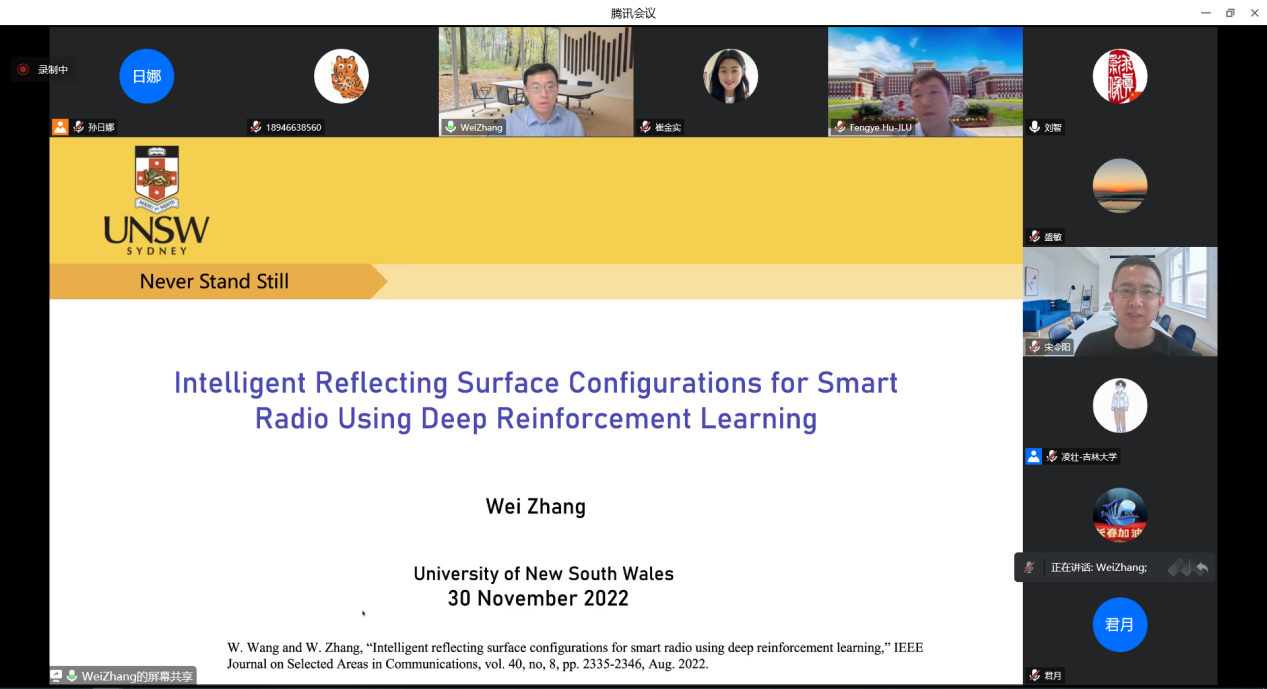On 30 November, 2022, from 8:30 to 17:00, the Workshop on Integration of Communication, Sensing and Computing in Next Generation Mobile Communications Network was successfully held online. The workshop was jointly organized by College of Communication Engineering, Jilin University, School of Optoelectronic Engineering, Changchun University of Science and Technology, Jilin Key Laboratory of Intelligent Sensing and Network Technology, and “111” Talent Introduction Base of Optoelectronic Information Sensing and Intelligent Instruments, Ministry of Education. The content of the conference involves all aspects of the integration of communication, sensing and computing, providing a new platform for in-depth exchanges and cooperation among experts and scholars in related scientific research fields in the industry. More than 100 experts and scholars at home and abroad, teachers and students from various colleges and universities attended the workshop.
Prof. Shen Xuemin (Sherman), Foreign Academician of the Chinese Academy of Engineering, Fellow of the Royal Society of Canada (RSC), Fellow of the Canadian Academy of Engineering (CAE), Fellow of the Engineering Institute of Canada (EIC), and “University Professor” of the University of Waterloo, Canada, served as the host of the opening ceremony and introduced to the participants the background of research on communication-sensing-computation integration, and from his own research in the fields of the needs of Internet of Vehicles (IoV) and autonomous driving. He explained the great significance and the huge challenges in the research of the integration of communication, sensing and computing. Finally, he encouraged the participants to communicate extensively and scale new heights bravely in this workshop. Prof. Zhao Xiaohui from the College of Communication Engineering, JLU, Prof. Song Lingyang from Peking University, Prof. Hu Fengye from the College of Communication Engineering, JLU, and Mr. Cui Jinshi from Changchun University of Science and Technology presided over the workshop as the Chairmen of the branch.

The workshop has invited eight well-known experts at home and abroad to deliver keynote speeches, including Prof. Zhuang Weihua from University of Waterloo, Canada, Prof. Nirwan Ansari from the New Jersey Institute of Technology, the U.S., Prof. Mao Shiwen from Auburn University, the U.S., Prof. Abbas Jamalipour from the University of Sydney, Australia, Prof. Nei Kato from Tohoku Univerisity, Japan, Prof. Liang Yingchang from University of Science and Technology of China, Prof. Sheng Min from Xidian University, Prof. Zhang Wei from University of New South Wales, Australia.

Prof. Zhuang Weihua, Fellow of Canadian Academy of Engineering and Engineering Institute of Canada, and “University Professor” of University of Waterloo, delivering a keynote speech entitled “Media Access Control of Industrial Internet of Things”.

Prof. Nirwan Ansari, NAI Fellow, Distinguished Professor of Electrical and Computer Engineering at the New Jersey Institute of Technology, delivering a keynote speech entitled “Harnessing Big Data and Artificial Intelligence for Next Generation Networks”

Prof. Mao Shiwen, Professor of Auburn University, the U.S., Earle C. Williams Eminent Scholar, Director of the Wireless Engineering Research and Education Center, delivering a keynote speech entitled “Indoor Radio Map Construction and Location Estimation with a Deep Gaussian Process Approach”

Prof. Abbas Jamalipour, Professor on Pervasive Mobile Networks from the University of Sydney, IEICE Fellow, IEA Fellow, Past President of IEEE Vehicular Technology Society, and Editor-in-Chief of IEEE Transactions on Vehicular Technology, delivering a keynote speech entitled “Communication, Sensing and Computing in Future Wireless Virtual Reality”

Prof. Nei Kato, Tenure-Track Professor of Tohoku University, Distinguished Lecturer of IEEE Vehicular Technology Society, Academician of the Engineering Academy of Japan, IEEE Fellow, IEICE Fellow, delivering a keynote speech entitled “Task Scheduling for Multi-Access Edge Computing in IRS-Aided Vehicular Networks”

Prof. Liang Yingchang, Foreign Member of the Academia Europaea, Professor of the University of Science and Technology of China, Editor-in-Chief of TCCN, Associate Editor-in-Chief of CHINA COMMUN, Editorial Board Member of Science China Information Sciences, delivering a keynote speech entitled “Intelligent Reflecting Communication: From Ambient Backscattering to Reconfigurable Intelligent Surfaces”

Prof. Sheng Min, Professor of Xidian University, Director of State Key Laboratory of Integrated Services Networks, Vice Chair of IEEE Xi’an Chapter, and Associate Editor of IEEE Transactions on Intelligent Vehicles, delivering a keynote speech entitled “6G Mage Satellite Constellation Enhanced Edge Intelligent Resource Management”

Prof. Zhang Wei, Professor of Electrical Engineering and Telecommunications, University of New South Wales, Vice President of IEEE Communications Society, Area Editor of IEEE Transactions on Wireless Communications, Editor-in-Chief of JCIN, delivering a keynote speech entitled “Intelligent Reflecting Surface Configurations for Smart Radio Using Deep Reinforcement Learning”
After the workshop, Prof. Liu Zhi from Changchun University of Science and Technology and Prof. Hu Fengye from the College of Communication Engineering, JLU made concluding speeches, expressing their sincere gratitude to the guests attending the workshop and their earnest expectation for further exchanges in the future.
During the one-day discussion, the participating guests conducted in-depth exchanges and discussions focusing on the theme of the workshop with the participating teachers and students on various topics, such as industrial Internet of Things, big data and artificial intelligence, smart radio, IRS-assisted vehicle network, intelligent reflecting communication, and 6G Mage satellite, which brought new ideas to communication and fields, fully stimulated teachers’ scientific research ability and enhanced the international vision of teachers and students.